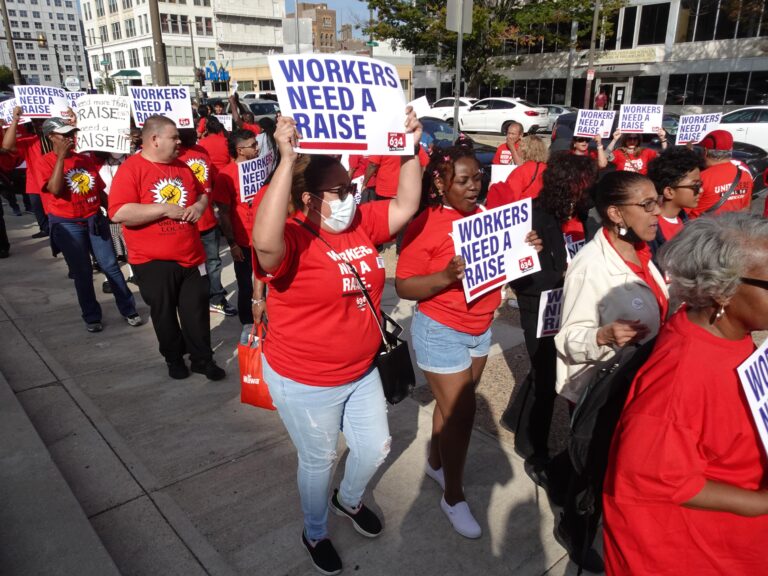Philadelphia Educators Poised for Strike Amid Growing Demands for Fair Compensation and Enhanced School Resources
Mounting Discontent Among Philadelphia Teachers Over Compensation and Work Environment
Teachers in PhiladelphiaŌĆÖs public schools are increasingly expressing dissatisfaction with their current salaries, which many argue fail to keep up with the cityŌĆÖs rising living expenses. Beyond classroom hours, educators often find themselves dedicating extra time without sufficient pay or access to necessary teaching tools. Alongside stagnant wages, concerns about deteriorating school infrastructure, insufficient supplies, and ballooning class sizes have intensified. These challenges have united educators in discussions about striking as a means to demand equitable pay and improved working conditions.
Primary concerns voiced by Philadelphia teachers include:
- Salary increments lagging behind inflation rates
- Chronic underfunding of classroom essentials and technology
- Excessively large class sizes hindering effective teaching
- Shortage of support personnel and mental health counselors
| Aspect | Current Situation | Requested Improvement |
|---|---|---|
| Average Teacher Salary | $65,000 | $75,000 or higher |
| Student-to-Teacher Ratio | 30+ students per class | 20 to 25 students per class |
| School Building Conditions | In need of repairs and upgrades | Modern, safe, and well-maintained facilities |
| Support Staff Availability | Minimal | Expanded counseling and support teams |
How Resource Deficiencies Undermine Teaching Quality and Student Success
The effectiveness of instruction in PhiladelphiaŌĆÖs classrooms is increasingly compromised by persistent shortages of critical resources and personnel. Teachers often must adapt lessons on the fly due to outdated textbooks, limited access to modern technology, and a lack of basic supplies. This chronic underfunding not only disrupts lesson delivery but also diminishes student engagement, making it difficult to address diverse learning styles and needs. Overcrowded classrooms and insufficient support staff force educators to split their focus between administrative duties and individualized student attention, ultimately reducing the quality of education and care.
These resource gaps have tangible negative effects on student achievement, especially among at-risk groups. Studies link inadequate resources to lower standardized test scores, higher absenteeism, and decreased graduation rates. The table below outlines key shortages alongside their impacts:
| Resource Deficiency | Effect on Students |
|---|---|
| Obsolete Textbooks | Reduced comprehension and engagement |
| Limited Access to Technology | Widening digital divide and achievement gaps |
| Insufficient Mental Health Counselors | Increased behavioral challenges and unmet mental health needs |
| Overpopulated Classrooms | Less personalized instruction and support |
- Teacher burnout is escalating due to stretched resources and growing student needs.
- Students experience daily uncertainty in an environment lacking adequate support.
- Parents voice growing worries about the long-term educational and emotional impacts on their children.
UnionŌĆÖs Call for Comprehensive Contract Revisions and Increased Investment
The teachersŌĆÖ union is advocating for a thorough revision of the current contract to address persistent issues related to compensation, working conditions, and resource distribution within PhiladelphiaŌĆÖs public schools. A central demand is for competitive salaries that align with the escalating cost of living, coupled with enhanced benefits that promote job stability and teacher wellbeing. The union emphasizes that existing agreements undervalue educatorsŌĆÖ expertise and commitment, contributing to high turnover rates and a shortage of qualified professionals.
Beyond salary concerns, the union is pressing for increased funding aimed directly at enriching student learning environments and fostering innovation in classrooms. Their proposals include:
- Reducing class sizes to enable more personalized instruction
- Upgrading technology and providing current teaching materials
- Expanding mental health and counseling services
- Offering professional development tailored to evolving educational challenges
This infusion of resources is viewed as critical to closing equity gaps that have widened due to years of budget cuts and resource scarcity affecting both educators and students.
| Contract Element | Union Proposal | Anticipated Outcome |
|---|---|---|
| Salary Adjustment | 15% increase over three years | Attract and retain skilled teachers |
| Class Size Limits | Maximum 20 students per classroom | Enhanced student participation and learning |
| Resource Allocation | Additional $50 million annually | Modernized technology and instructional materials |
Approaches to Avoid Extended School Disruptions Through Effective Negotiations
Successful resolution depends on open, ongoing communication among all stakeholders. Establishing transparent dialogue channels beyond formal negotiation sessions allows teachers, administrators, and union leaders to share concerns and updates promptly. Engaging neutral third-party mediators with expertise in labor relations can help maintain constructive discussions and prevent emotional deadlocks. Identifying non-negotiable issues early, alongside areas open to compromise, creates a clear framework to avoid prolonged conflicts.
Recommended negotiation strategies include:
- Scheduled progress reviews: Regular meetings to evaluate negotiation status and recalibrate approaches.
- Evidence-based discussions: Leveraging data on performance and budgets to inform decisions objectively.
- Community involvement: Engaging parents and local leaders to build widespread support and encourage resolution.
- Phased agreements: Breaking down complex issues into smaller, achievable deals to foster trust and momentum.
| Strategy | Advantage | Expected Result |
|---|---|---|
| Third-party Mediation | Neutral conflict resolution | Prevents escalation |
| Regular Progress Updates | Keeps negotiations on track | Accelerates agreement |
| Community Engagement | Builds public backing | Increases pressure to settle |
| Data-Driven Negotiations | Ensures objective clarity | Enhances mutual trust |
Looking Ahead: The Future of PhiladelphiaŌĆÖs Public Schools Amid Labor Tensions
As negotiations continue, PhiladelphiaŌĆÖs educators remain steadfast in their pursuit of fair compensation, improved classroom environments, and expanded support services. The looming possibility of a strike highlights a nationwide dialogue about the challenges confronting public education and the indispensable role teachers play in shaping future generations. The coming weeks will be pivotal in determining whether a mutually agreeable solution emerges or if the cityŌĆÖs schools face significant operational disruptions. Observers locally and nationally are closely monitoring the situation, recognizing that its resolution could influence labor relations in education across the country.








